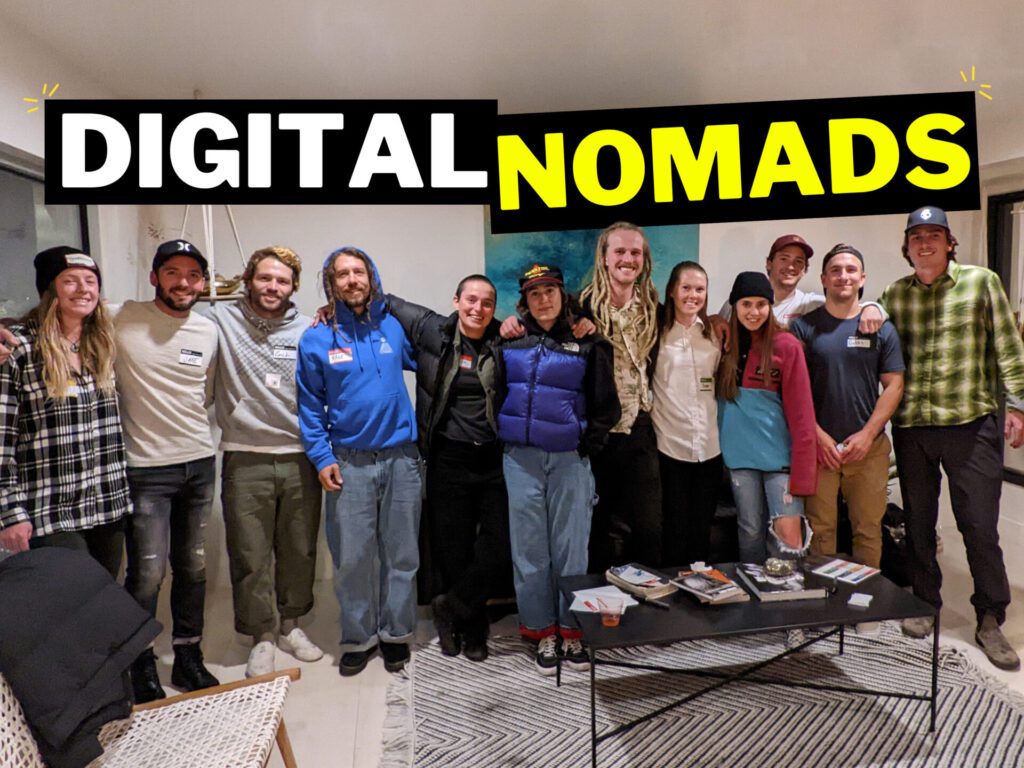Last updated: May 26, 2024
Are you a traveler or digital nomad who wants to make new friends?
Maybe you just arrived in a new city and your goal is to create new connections.
This article will describe why you should host a small party or happy hour, where to host it when you don’t have a home or apartment, and exactly how to make it a success.
Here’s the list of possible venues that we will review:
- Hostels
- Coworking Spaces
- Public Parks
- Friend Houses
- Rental venues: Airbnb and Peerspace
- Hotel Lobbies and Hotel Bars
- Restaurants
You’ll learn how to build big relationships by hosting a small gathering for other remote workers. And you’ll build a community fast to fill up your social calendar (and maybe even grow your business).
Why you should listen to me: My name is Nick Gray. I’ve hosted hundreds of parties around the world. I even wrote a book about hosting parties. The New York Times, The Wall Street Journal, and New York Magazine have all written about me. But this article is different. I’ll be interviewing an actual real-life digital nomad who recently hosted three parties in Bali and Salt Lake City. Meet Shaggy, a Digital Nomad
Shaggy Eells is a freelance copywriter who travels full-time, mostly in North America and South East Asia. I’ll be interviewing him here for this article to give you his tested advice, best tips, and tricks for hosting when you’re new to town.
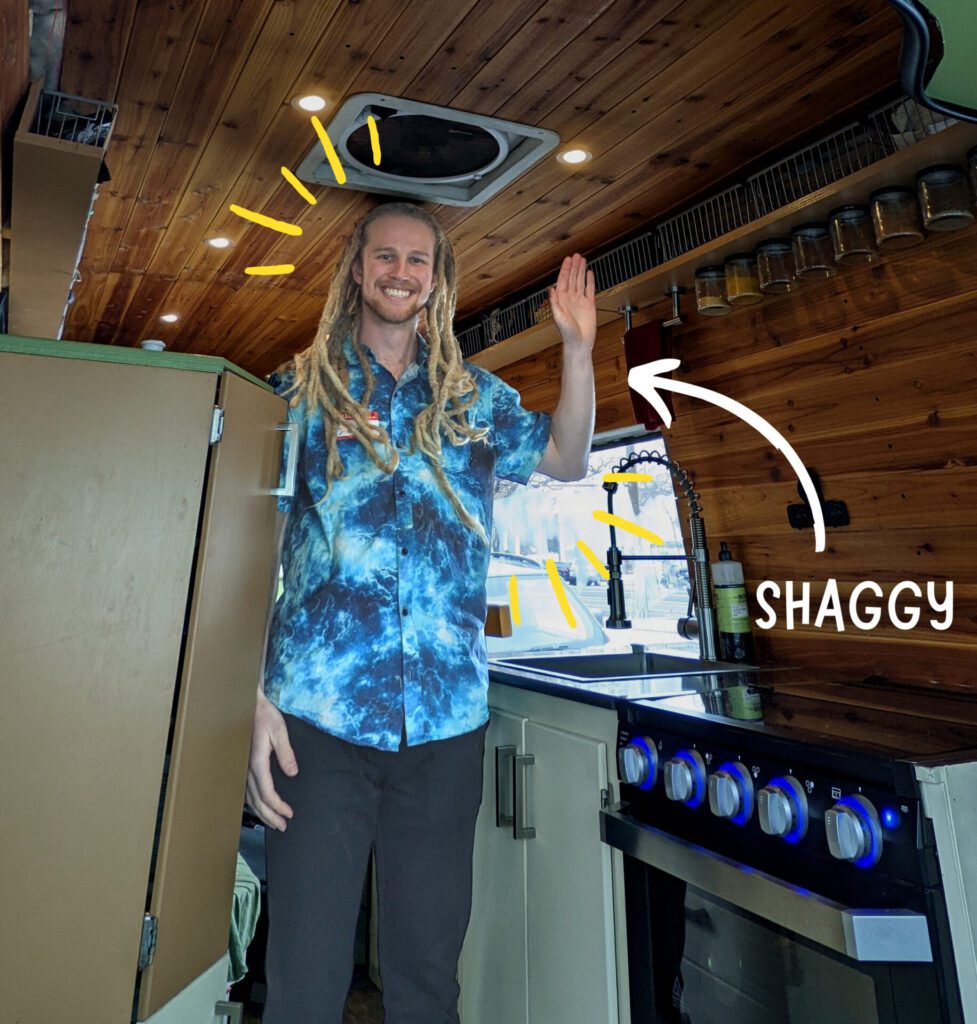
I wanted to interview Shaggy because he’s found a few ways to work around the unique challenges that digital nomads might have when hosting a party.
Common issues of being a digital nomad are that most don’t stay in one area for long and they don’t have great homes or apartments to invite 15 to 20 people over. That makes it hard to be the center of attention or the host of a party.
Hosting at Hostels
When Shaggy was in Canggu Bali, he was living and working at a place called Draper Startup House. There he met a ton of travelers, digital nomads, and entrepreneurs from all around the world.
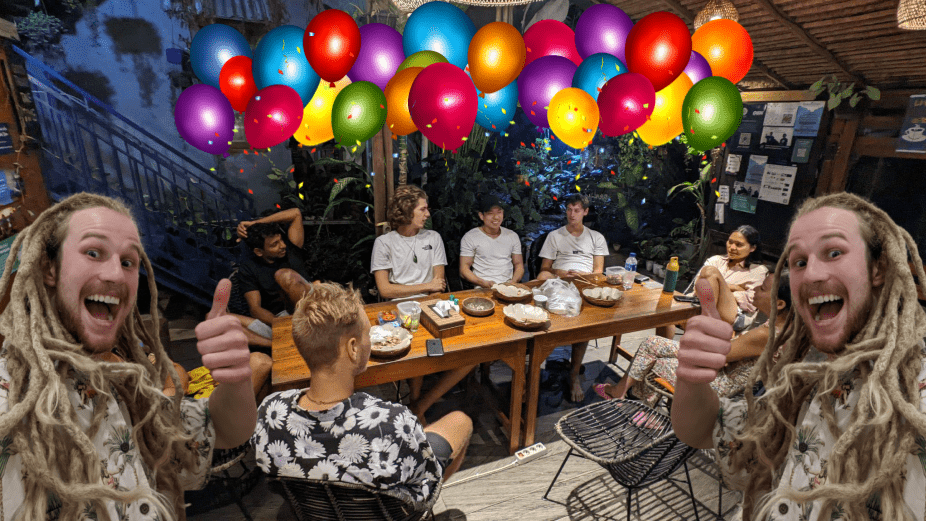
This is what you should do to host a cocktail party in a hostel:
- Talk to the owners to make sure you can host a party there
- Pick a date and start inviting your core group
- every time you meet someone interesting, invite them
- Gather the necessary supplies and enjoy yourself
Co-Working Spaces
Since late 2022 Shaggy has been in Utah. Like most digital nomads, he has some form of coworking or office space.
These are the key lessons that you should remember when hosting at a coworking space:
- Ensure access. Check what time you’ll be able to get inside!
- Trash and cleanup. How will you handle the mess?
- Parking and entering. Is it easy to find the parking lot and the entrance?
Shaggy hosted his most recent party at a co-working place called Maven. The free conference room he rented proved to be an excellent space for icebreakers and cocktails.
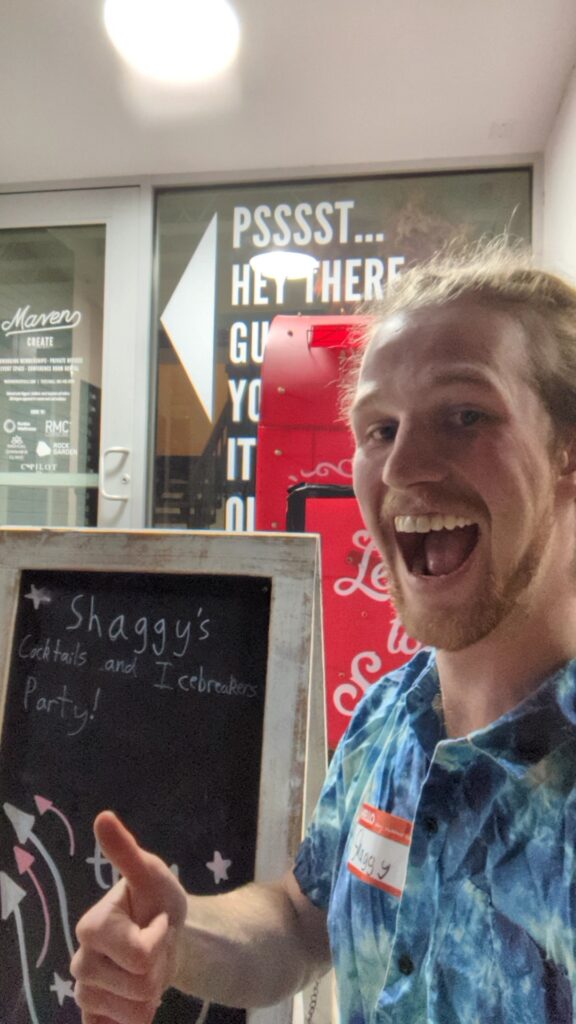
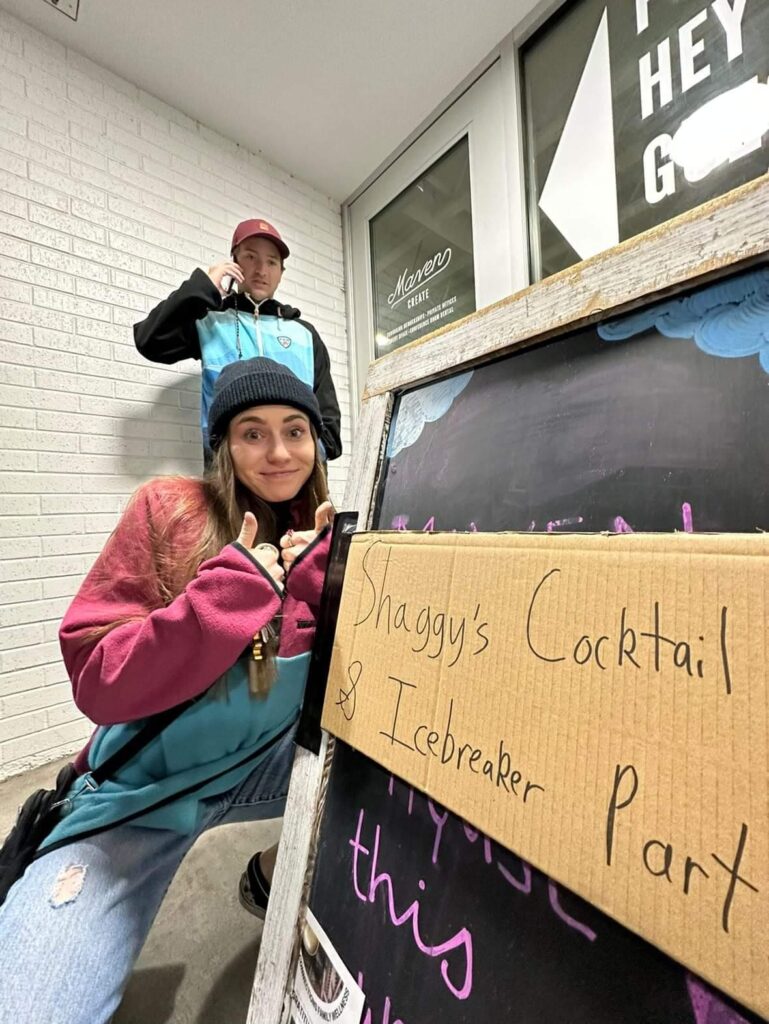
An advantage of hosting in co-working spaces is when you are traveling all the time, you usually don’t have any miscellaneous party supplies such as signs, markers, bowls, plates, napkins, and food containers. But most co-working places have all of these supplies just sitting around!
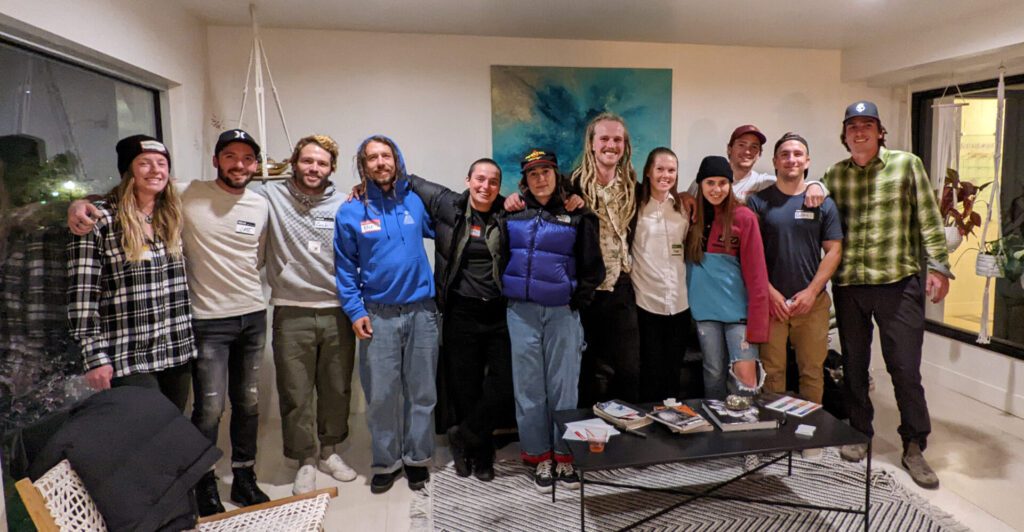
Hosting in Public Parks
In most metropolitan areas there are endless amounts of public parks for your free use.
The gamble is going to be the weather conditions. If you plan to host in a public park, make sure to have a backup plan like a restaurant in case the wind or rain is unpleasant.
Picnic Parties: See this article with Sydney in NYC’s Central Park for everything you need to host a successful picnic party.
Do these things to host a great picnic in a public park:
- Pick a convenient location in the park.
- Create a page to collect RSVPs. Include relevant location information (where your picnic will be!) on this page.
- Send at least one reminder message before the day of your picnic.
- Use name tags! Buy name tags and a marker beforehand.
- Clean up afterwards to leave the public space nicer than you found it.
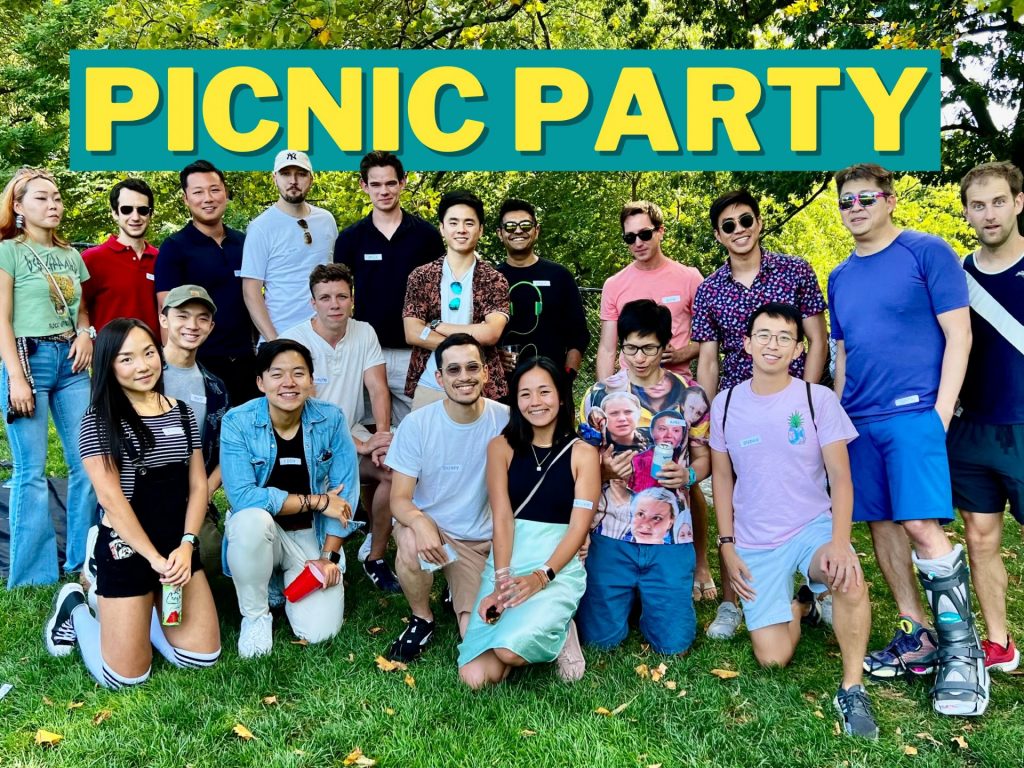
Other Hosting Location Ideas
Maybe your town doesn’t have a coworking spot, a hotel lobby, or an easily accessible public park. Here are a few other location or venue ideas to host your gathering.
- Friends Houses: You could bribe your friends with some cookies or beer to persuade them to let you use their space. And tell them about the amazing people they will be able to meet! If they still say no, offer to clean their house before and after the party.
- Restaurants: Look for restaurants with a section that has a standing area without loud music. Shaggy has met some people who walk into restaurants and ask the staff “what nights are usually the slowest?” Then they offer to bring in at least 15 people that night and ask to have a little section of the restaurant closed off for their party (free of charge).
- Rent an Airbnb or Peerspace: A classy way to make a cocktail party happen! Make sure in the details of the Airbnb rental that you are allowed to host a party of 15 people. Peerspace is another option, most commonly used in North America, for event spaces that are specifically designed for hosting events. But they can be expensive.
- Hotel Lobbies or Hotel Bars: Tons of places are open 7 days a week and have slow weeknights. The perfect opportunity for you! One of Shaggy’s friends reserved a conference room at a hotel by committing to buy 100 PBRs for $1 each.
How to Quickly Meet People in a New Area
Great, now that you know how to host a party as a digital nomad, it’s time to meet some friends to invite!
The problem that most digital nomads run into is they are frequently traveling and don’t stay in an area long enough to meet a ton of people. And since you want to have 15 people show up, you’ll want to invite 20-30 people you know.
Continue reading: See our article How to Make New Friends for specific tips on where and how to meet people when you’re new to town.
Lessons Learned
I interviewed Shaggy to find out exactly how he was able to meet so many people during his travels.
Q: How did you meet people in new areas?
A: You would not believe how many people you can meet when you are consistently willing to walk up to someone and introduce yourself. Nothing fancy, just a simple “Hey how’s it going? My name is Shaggy” (then dive into some small talk.) Especially in the post-COVID era, most people are socially anxious to walk up to people.
Q: You created small groups for icebreakers. How’d it go?
A: Wonderful! For icebreaker round two, I created groups of five people who didn’t know each other by writing a letter on their name tags. Then each group formed and answered five advanced icebreakers from a little post-it note. This gave more time so everyone could ask questions about each other’s answers. It created a fun small group dynamic in the room that sparked a lot of conversations!

Q: You rented a conference room in the co-working space, how was that?
A: Super convenient for me. Since I live in a sprinter van or a backpack, I have nowhere to invite guests over to. After moving the tables to the sides, and taking away the chairs, we had a perfect room for everyone to mingle. The co-working space also has a ton of useful event supplies I used.
Q: What were some lessons that you learned?
A: Oh I learned a ton of things! Planning vs hosting a party is a lot different. Here are my big three takeaways:
- Spend most of your time inviting people. The value you provide to the guests is the other guests who attend.
- Make sure people who say yes actually RSVP. It’s like a social contract.
- Have a fun name and explanation for your event. You have to sell this as a worthwhile experience.
Q: What else helped you to host the event?
A: Well, meeting enough people is the most difficult part. Fortunately, I met a ton of other people by going to other events, like toastmasters and socializing events from MeetUp. I would spend extra time before and after these events to mingle with interesting people.
Conclusion
When you’re new to town, the best way to get situated is to meet locals. Meeting new people and hosting a small party or happy hour can be a great way to get more comfortable as a digital nomad.
Don’t overthink this! Get started with these three key steps:
- Collect names and contact info of everyone that you meet.
- Pick a venue that is suitable for your gathering.
- Follow the steps from The 2-Hour Cocktail Party to plan your party including: hosting on Monday-Wednesday, collecting RSVPs, sending reminder messages, using name tags, and running icebreakers.
- Take a group photo at the end of the party.
The most important criteria for whether or not you should invite someone to your party is if you want to continue the conversation you had with them. Chat up everyone you meet: the barista, people at your hostel or coworking space, and more.
Follow these steps and your new friends will be begging you to host more parties.
If you want to host even better parties, grab a copy of my book and learn more.

